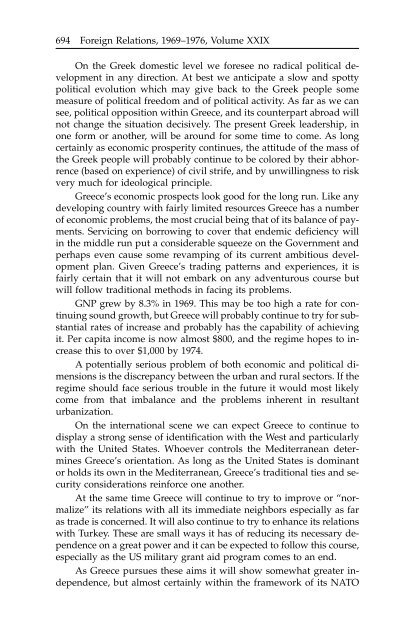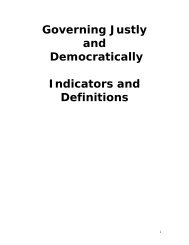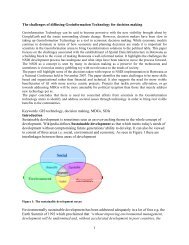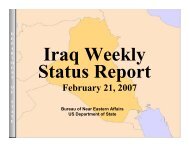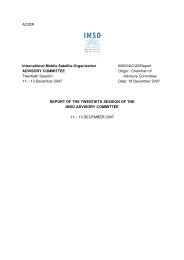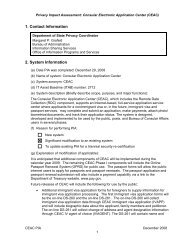Greece - US Department of State
Greece - US Department of State
Greece - US Department of State
Create successful ePaper yourself
Turn your PDF publications into a flip-book with our unique Google optimized e-Paper software.
694 Foreign Relations, 1969–1976, Volume XXIX<br />
On the Greek domestic level we foresee no radical political development<br />
in any direction. At best we anticipate a slow and spotty<br />
political evolution which may give back to the Greek people some<br />
measure <strong>of</strong> political freedom and <strong>of</strong> political activity. As far as we can<br />
see, political opposition within <strong>Greece</strong>, and its counterpart abroad will<br />
not change the situation decisively. The present Greek leadership, in<br />
one form or another, will be around for some time to come. As long<br />
certainly as economic prosperity continues, the attitude <strong>of</strong> the mass <strong>of</strong><br />
the Greek people will probably continue to be colored by their abhorrence<br />
(based on experience) <strong>of</strong> civil strife, and by unwillingness to risk<br />
very much for ideological principle.<br />
<strong>Greece</strong>’s economic prospects look good for the long run. Like any<br />
developing country with fairly limited resources <strong>Greece</strong> has a number<br />
<strong>of</strong> economic problems, the most crucial being that <strong>of</strong> its balance <strong>of</strong> payments.<br />
Servicing on borrowing to cover that endemic deficiency will<br />
in the middle run put a considerable squeeze on the Government and<br />
perhaps even cause some revamping <strong>of</strong> its current ambitious development<br />
plan. Given <strong>Greece</strong>’s trading patterns and experiences, it is<br />
fairly certain that it will not embark on any adventurous course but<br />
will follow traditional methods in facing its problems.<br />
GNP grew by 8.3% in 1969. This may be too high a rate for continuing<br />
sound growth, but <strong>Greece</strong> will probably continue to try for substantial<br />
rates <strong>of</strong> increase and probably has the capability <strong>of</strong> achieving<br />
it. Per capita income is now almost $800, and the regime hopes to increase<br />
this to over $1,000 by 1974.<br />
A potentially serious problem <strong>of</strong> both economic and political dimensions<br />
is the discrepancy between the urban and rural sectors. If the<br />
regime should face serious trouble in the future it would most likely<br />
come from that imbalance and the problems inherent in resultant<br />
urbanization.<br />
On the international scene we can expect <strong>Greece</strong> to continue to<br />
display a strong sense <strong>of</strong> identification with the West and particularly<br />
with the United <strong>State</strong>s. Whoever controls the Mediterranean determines<br />
<strong>Greece</strong>’s orientation. As long as the United <strong>State</strong>s is dominant<br />
or holds its own in the Mediterranean, <strong>Greece</strong>’s traditional ties and security<br />
considerations reinforce one another.<br />
At the same time <strong>Greece</strong> will continue to try to improve or “normalize”<br />
its relations with all its immediate neighbors especially as far<br />
as trade is concerned. It will also continue to try to enhance its relations<br />
with Turkey. These are small ways it has <strong>of</strong> reducing its necessary dependence<br />
on a great power and it can be expected to follow this course,<br />
especially as the <strong>US</strong> military grant aid program comes to an end.<br />
As <strong>Greece</strong> pursues these aims it will show somewhat greater independence,<br />
but almost certainly within the framework <strong>of</strong> its NATO


